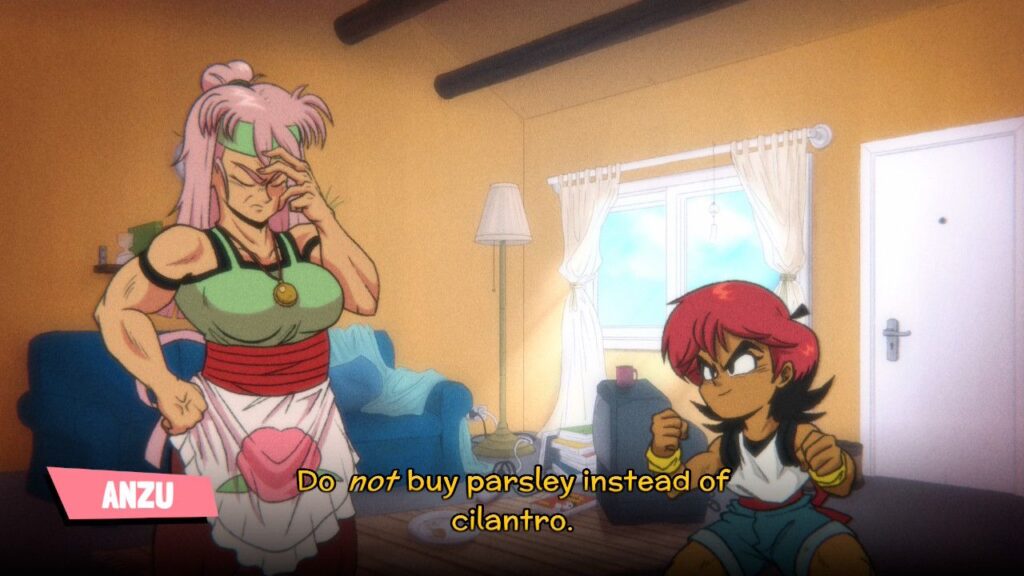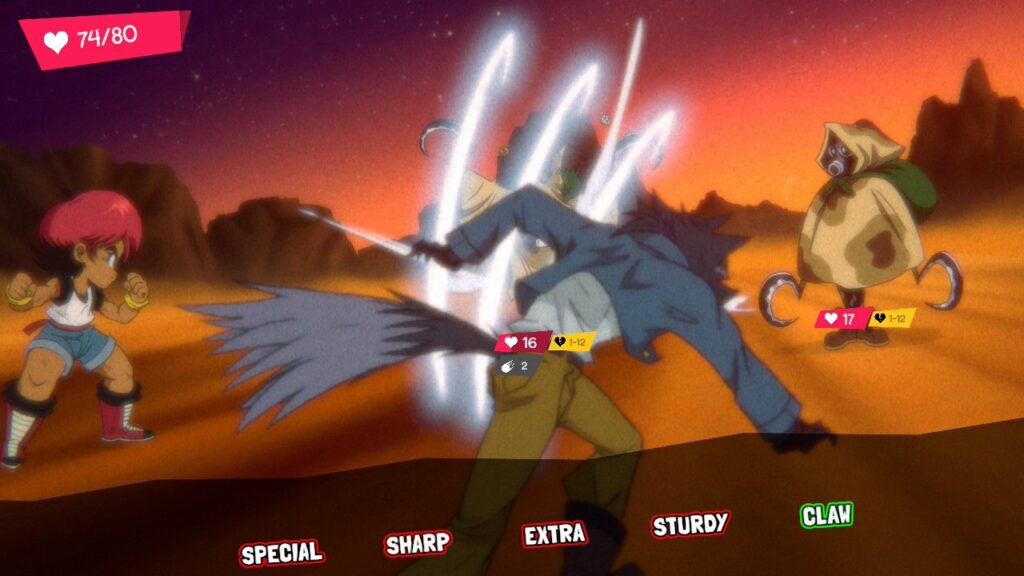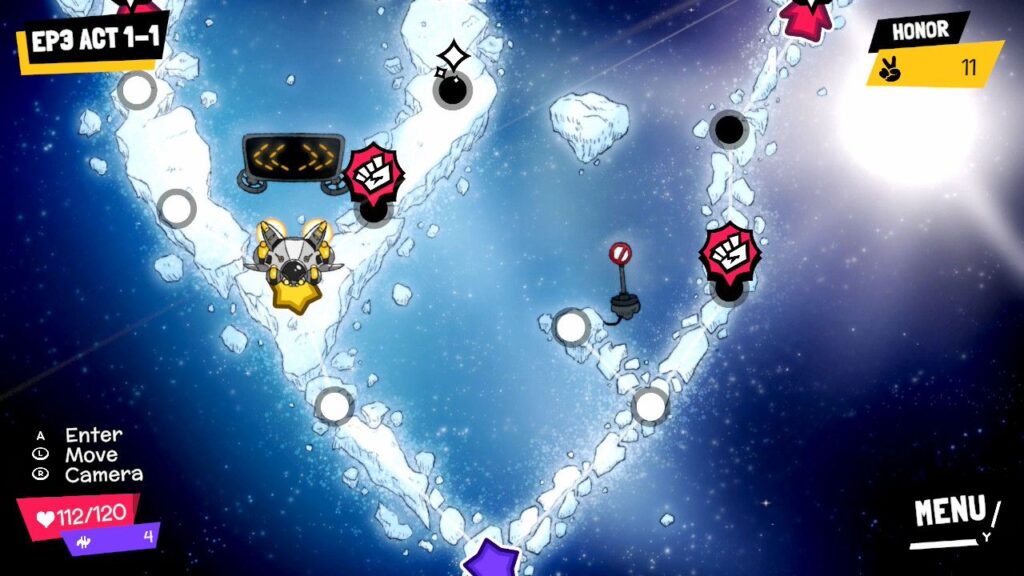I never had Cartoon Network at my house, or maybe I did, but we gave it up for some reason. I think, if I remember correctly, Sega Channel required giving up channels through cable, so I might have lost it through that. I honestly can’t remember. What I can remember was spending summers at my grandmother’s house, who did indeed have the channel. All the shows and TV blocks were addictive to my child’s brain, but one day, while just parked in front of the TV, this block of Japanese shows came on, which were pretty new to America at the time, not available in droves through 50 streaming services, with several specifically dedicated to them. Among these kings of broadcast was Dragon Ball Z, which used to run back-to-back episodes, which was great since fights in that show took entire 50-episode arcs. Wander Stars, thankfully, isn’t that bad at pacing, but it does invoke that look-forgotten feeling when your eyes would light up to everything on screen.
Wander Stars opens up with a title card, Episode 1 Ringo, Watch Out!! The Big Bad Wolfe Appears! This is a classic episode car to a classic Anime and helps set the stage for everything that is going to follow. Players take the role of Ringo, who is raised by her tough-as-nails Grandma, and dreams of taking part in an upcoming fighting tournament. This seems to be everything you need to know until the character of Wolfe, who is indeed a wolf, appears and steals a map fragment from Ringo, albeit accidentally, which leads to her chasing him down and beating the stuffing out of him. The two then become partners on an adventure that will take them through Ringo’s homeworld and eventually beyond it through the use of a spaceship, with each aiming for different goals in the process.

The presentation here is that of a long-lost anime, one that feels familiar yet you can’t place it. The game screen has a grain to it, some darkening around the edges, and the world plus characters are given the Dragon Ball treatment, feeling nostalgically like the world and characters of the aforementioned anime. Where the game really strives to master the popular anime and Toriyama’s style is in facial expressions, where Ringo will often make expressions with her exaggerated eyes, with the character having some similar dimensions to Young Goku, especially in her muscular thighs, as the character is meant to have some similarities, but manages to still feel unique. Supporting characters similarly draw from the animals that populate that world, with Surfing Capybara’s, boxing crabs, and so much more.
The soundtrack of Wander Stars, composed by Marcos Villarejo “Sayth Vashra”, also invokes some nostalgia, though weirdly not to Dragon Ball for me, but Final Fantasy. Since the game plays out on grid-shaped boards, the music matters since the repetition of it never really got to me. Crisp orchestral notes, and wonderful use of piano, the beat is more Jazz than expected, feeling more like Cowboy Bebop, though admittedly it’s been a while since I really sat down and watched them. Either way, the soundtrack is a joy that makes every facet of the stages more engaging. An issue with the game is that there are points where audio completely cuts out, usually during flashbacks near the end of each chapter. Multiple checks did showcase that during cinematic cutscenes near the end of each chapter, the game would go mute and never pick up, even when they ended. Normally, the dialog has boops as it appears on screen, which would no longer play as well. The sound would return once the chapter ended and you were on the main screen, which makes it weirder, if this is a glitch or aesthetic choice.

In the middle of all these artistic choices is a turn-based RPG that forms the crux of the game. Ringo is a martial artist, so fights play out with her on one side and enemies on the other, all still represented by the nostalgic art style, including when characters recoil from getting hit. In order to fight, the player will pick up words that fall into three categories that they will need to combine together into one super combo, like calling out their move in a classic anime, in order to inflict damage on the enemy. Despite some tutorials, this system can actually be hard to figure out, but it takes effort. Not all words add to your damage, but some add status effects or cooldown reductions. Learning more words and figuring out how to combine them to maximize not just your current attack, but to leave room for your next attack, is paramount. You can even block or counter, diversifying just how Ringo can fight. While she gains allies as she goes, the turn-based combat will only feature her as a participant, making word mastery the most crucial aspect to survival.
Levels are set on the game board like layouts, though there is no concept of cards or dice that impact your movement, so you can simply explore how you choose to do so. There are multiple paths as well, but no real limit on backtracking, so moving along a second path can be done to collect anything you missed. Ending combat leaves moves on cooldown, so stepping on black spaces can accelerate that, which forms the slight give-and-take in movement, as black spaces turn white as you step on them. Stages have a grading system and can be replayed, with players earning a currency at the end of the stage to level up, and in this, you get the twist on combat as you earn more of the currency for a peaceful finish, trying to injure enemies only to a specific threshold, making truly winning combat a puzzle mixed into the RPG, with neither feeling like it gets lost in the experience.

Beaten Wander Stars stages offer far more replayability than was expected as well. For starters, levels and difficulties have a three-star completion metric that you can earn, being rewarded for not getting Koed in your playthrough, or winning every fight with the peaceful option. On top of this, a challenge mode is unlocked after you finish the level, which adds crazy quantifiers to a playthrough, like way more weaknesses, or enemies literally being invisible. This mode is an even higher difficulty than prior, as well, for even more challenge. Each run earns you more points for levels, with difficulty adding modifiers to increase the amount you earn, making replaying a great way to farm up your skill levels for the next chapter. I can say, though it is easy to farm up too much, lessening some of the challenge as you progress.
The complaint here, though, is that stages can be time-consuming. Most have about four areas with several fights in each. Stages also have over spaces, like a question mark event that stops you for a scene, and other dialog spaces are there where you can move to and see a scene. Placement can change, but even on repeats, they tend to follow a similar structure. Cutscenes are also on replays, and there isn’t a skip; instead, a fast forward that still forces you to feel like you are wading through lengthy moments that you need to continually trigger to get through. First stage, for instance, took about an hour on my first run, with my second and third still taking about 40 minutes apiece, which can start to feel like a drag, especially since almost everything repeats, rather than having anything new.

Verdict
Wander Stars is a great piece of nostalgia that does what anything attempting to evoke those feelings should do. The experience feels like something I remember from years ago, using the art of Akira Toriyama and a vibe familiar to fans, and feeling like I grew up with it, to create an experience that doesn’t feel like it is just a rehash. A creative RPG that is sure to offer plenty of fun for both fans of puzzles and turn-based games, and an engaging story and soundtrack, should make this a game to look out for. Granted, there are some technical issues. The repetition of time sinks of stages, especially on replay, can also be annoying, but when a game can make you overlook those things to keep playing, that’s a pretty decent mark you’re gonna have a good time.
Remember to follow us on Twitter, Facebook, and Bluesky to keep up to date on everything we have going on!
Reviewed on Nintendo Switch, Alsoi Available on PlayStation 5, Xbox Series, and PC
*A review key was provided for this game by Fellow Traveller for the purpose of this review.
Developer: Paper Castle Games
Publishers: Fellow Traveller
Release Date: September 19, 2025
Good:
+Enjoyable Nostalgic Narrative and Art Style
+Great Soundtrack
+Fun RPG combining Puzzles with Combat
+Replayability with a lot of modes
Bad:
-Some technical issues
-lengthy stages with repetitive content
-
Wander Stars